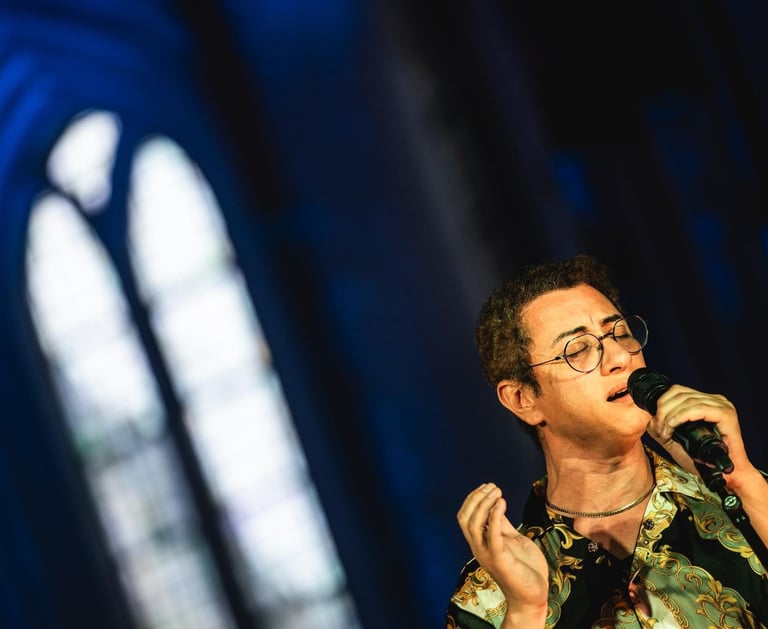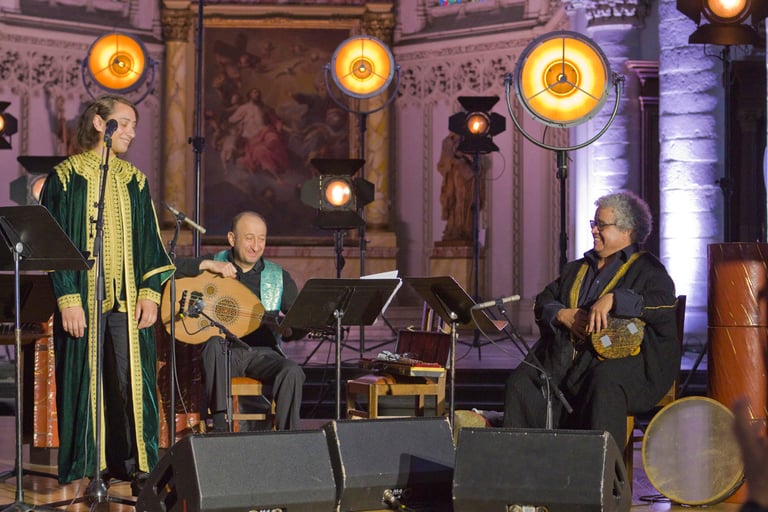Singing
I love to share my music. Most importantly I do that through concerts, either alone or with other musicians, and through teaching.
The variety of music from the Middle East is huge. Whatever your taste may be, there is a big chance that you will find something of your liking in there.
If you are looking for depth and spiritual development, you might like old Christian songs from the Byzantine and Maronite traditions, sung in Arabic, Aramaic or Old Greek.
...or how about songs from the Andalousian and Sephardic traditions of the Middle Ages? If you are into Folk Music, early Medieval music or simply music with a (far) southern European feeling to it, there is a big chance that this will be your choice!
Another favourite theme is Great Singers and Composers of Classical Arabic Music from the 19th and 20th century! For people who are not used to listening to Arabic Music, this theme provides a good opportunity to get a first impression and overview in a pure, original setting. Varied and colourful, this type of concert will appeal to most people. Within this kind of music, it is possible to additionally choose a theme like "Happiness", "Sadness", "Thoughtfulness", "Travelling" and so on.
Still no idea what to choose? Then how about a journey through the Arabic world in Traditional Songs? The Magic Carpet concert provides a great introduction to the Arabic World from Morocco all the way to (and including) Iraq. It not only includes songs from the 19th and 20th centuries, but also older songs from the Sephardic, Andalousian, Soufi, Maronite and Byzantine traditions. Therefore this concert provides a look at Arabic life through the ages, but from a worldly view and from a spiritual view.
J'adore partager ma musique. Plus important encore, je le fais à travers des concerts, seul ou avec d'autres musiciens, et à travers l’enseignement.
La diversité dans la musique orientale est énorme. Quel que soit votre goût, il y a des grandes chances que vous y trouviez quelque chose qui vous plait.
Si vous recherchez la profondeur et le développement spirituel, vous aimeriez peut-être les vieilles chansons chrétiennes des traditions byzantine et maronite, chantées en arabe, araméen ou grec ancien.
... ou que diriez-vous des chansons des traditions andalouses et séfarades du Moyen Âge? Si vous aimez la musique folklorique, la musique ancienne médiévale ou tout simplement la musique avec un sentiment (loin) du sud de l'Europe, il yá une grande chance que vous allez trouver la ce que vous cherchez!
Un autre thème préféré est celui des concerts où je chante des reprises des grands chanteurs et compositeurs de musique arabe classique du 19e et 20e siècles! Pour les personnes qui ne sont pas habituées à écouter de la musique arabe, ce thème offre une bonne occasion d'avoir une première impression et un aperçu dans un cadre pur et original. Varié et coloré, ce type de concert plaira à la plupart des gens. Dans ce type de musique, il est possible de choisir des thème comme "Bonheur", "Tristesse", "Réflexion", "Voyage" et ainsi de suite.
Vous ne savez toujours pas quoi choisir? Alors que diriez-vous d'un voyage à travers le monde arabe en chansons traditionnelles? Le concert Magic Carpet offre une excellente introduction au monde arabe du Maroc jusqu'à (et y compris) l'Irak. Il comprend non seulement des chansons des XIXe et XXe siècles, mais aussi des chansons plus anciennes des traditions séfarade, andalouse, soufie, maronite et byzantine. Par conséquent, ce concert offre un regard sur la vie arabe à travers les âges, mais d'un point de vue profane et d'un autre spirituel.




